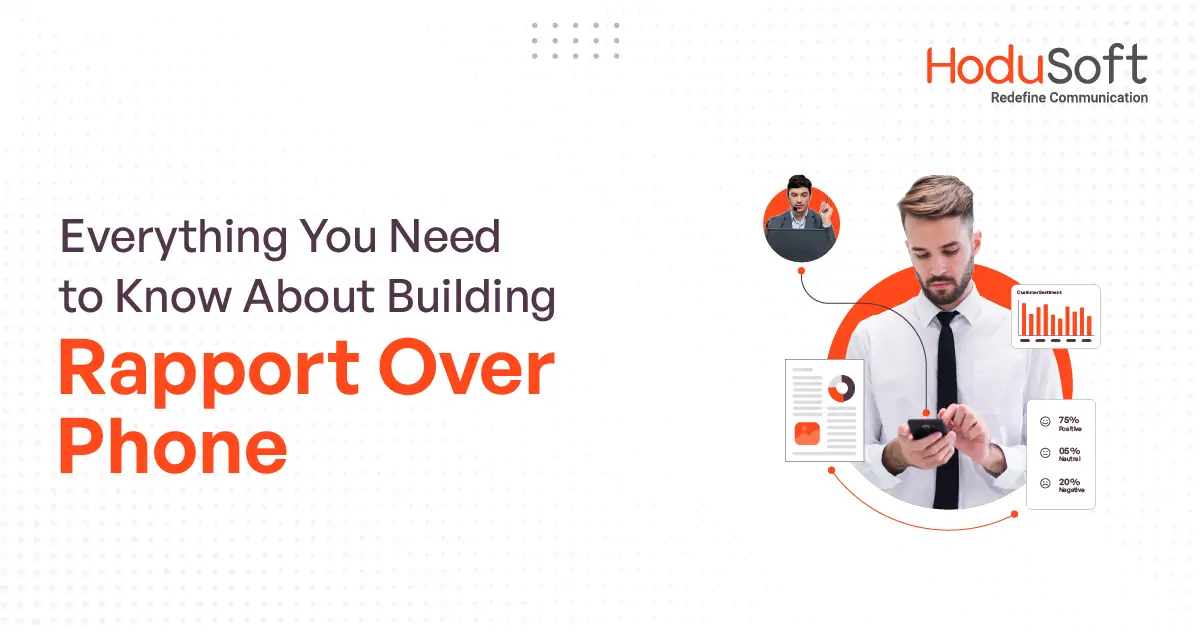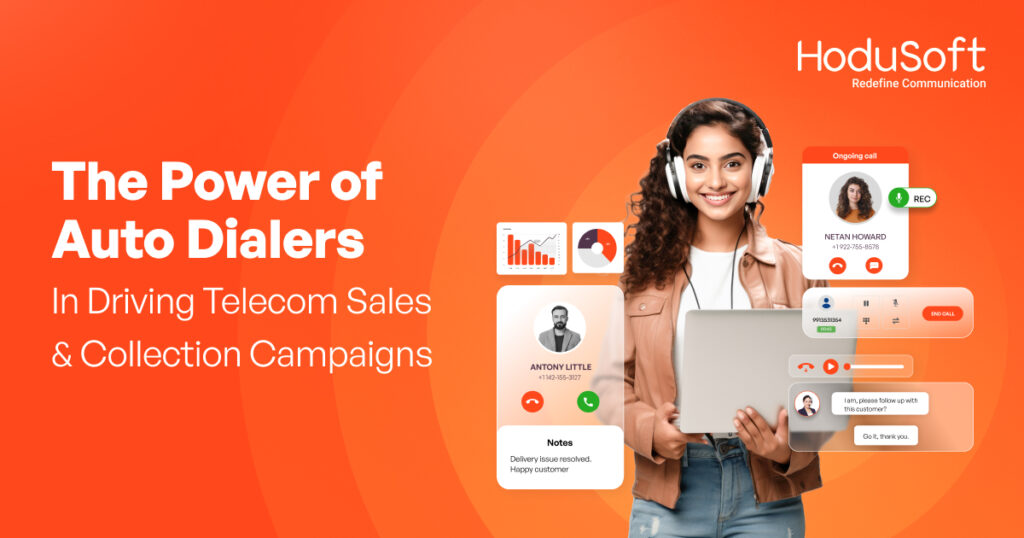Everything You Need to Know About Building Rapport Over Phone
For every business, building trust and rapport is the Holy Grail for success. All businesses use different strategies to build rapport with their prospects and customers.
Some use in-person tactics to forge friendly and harmonious relationships with their target customers, while some use phones and digital media to achieve the same.
When the prospect is right in front of you, then it’s easy to charm them with a warm smile, speak with them, look directly into their eyes, read their body language, and answer their questions.
But it gets a little tricky when the prospect is on the other side of the phone and you have no idea what they are doing, how they are feeling, and if they are in a good mood or not.
However, if businesses succeed in building rapport over the phone, then the results could be extremely rewarding. Let’s look at some stats.
As per a study, almost three-quarters of customers will be loyal to a brand that has friendly customer service agents. Another research found that more than two-thirds of customers said that they would pay more to receive excellent customer service. Building strong rapport is one of the most crucial aspects of exceptional customer service.
This blog post discusses some useful tips for businesses to build rapport with prospects and customers over the phone as well as how the right contact center software can help customer service agents.
Read on the blog till the end to know how you can choose the right contact center software to build a strong rapport.
Tips to build rapport with customers
Be it handling incoming calls or dialing outgoing calls, the first step to ensuring effective customer relationships is building a strong rapport. These seven tips can help a lot with rapport building.
1. Open the call with a smile and maintain it throughout the call
Here’s a fun fact—smiles are contagious and they have a sound. A study conducted by a group of researchers in the UK found that people don’t need to see a smile but can perceive the sound of different types of smiles when they’re interacting with someone on the phone.
Another study conducted by a group of researchers in Paris found that smiles don’t just have a sound but are contagious. When a person hears someone smiling during a phone call, they are more likely to mimic the gesture.
That’s why customer service representatives should smile as they speak with customers, every single time. While calling someone, smile and greet them just as you would when you meet them in person.
The smiling voice is far more relaxing and welcoming than a non-smiling voice. The person on the other side is more likely to perceive the smile and warm up to you. Make sure that you maintain a good posture while doing that.
2. Ask customers how they’d like to be addressed
When you call someone or receive a call, you are likely to speak to someone much older (or younger) than you. They may come from different backgrounds and they may like to be addressed by their preferred titles and identity.
For instance, if you’re speaking with a physician it’s prudent to address them by their title (Dr.) and surname. The problem is you can’t see who is on the other side, so you should ask them how they’d like to be addressed.
Most of the time, callers will insist that you call them by their first name. In that case, you must make sure that you pronounce their names correctly and address them by their names throughout the call in a friendly and caring manner. Repeating names multiple times will act as reinforcement and enable you to remember them for a long time.
3. Listen intently
To build rapport with prospects and customers over phone calls, listening with intent can be a game changer. Actively listening to the callers can enable you to understand what they want and equip you to help them better.
But when it comes to listening actively, a majority of people struggle. A study found that the average person listens at nearly 25 percent efficiency.
But thankfully, several ways are using which agents can listen actively. The most basic step is to let the person on the other line speak and resist the urge to interrupt.
Pay undivided attention to details and focus completely on their words. Use words such as “I see,” “I understand,” and “Right,” at regular intervals to let them know that you’re listening.
4. Put yourself in your callers’ shoes
Several recent studies have found a direct connection between empathy and increased rapport in phone calls.
A study conducted by Denmark-based customer engagement software company Dixa found that 96 percent of customers perceive empathy as the key to excellent customer service.
In such a scenario, showing empathy to people on the other side of the call is a great way to increase rapport.
Agents can empathize with customers by looking at the situation from the other party’s point of view.
Agents also should put themselves in the shoes of their customers and use phrases such as “I can understand how you feel,” or “I see where you’re coming from and I completely understand what you mean by that” to show that they care about the other party.
5. Match their energy and speed
Did you know agents can build rapport over the phone in a subtle way by matching the energy and speed of a person on the other side of the call?
Agents are more productive and receptive when they match customers’ energy and speed. That’s because mirroring the other person’s energy and speed can enable agents to listen to them effectively and maintain a positive emotional state during the interaction.
Let’s suppose that you get a call from someone who is a slower talker. If you speak too fast, then they’ll find it hard to keep up with you, or worse, they may get overwhelmed by the sudden flurry of information.
But if you speak slowly with a quick talker, then you may bore them. That’s why it’s advisable to match the other person’s energy and speed without changing your personality or style of speaking.
6. Ask open-ended questions
Productive and open-ended questions play a huge role in building rapport and connecting people on a personal level. When it comes to questions, there are two types—close-ended and open-ended.
The former asks respondents to choose a “yes” or a “no” or any option in a set of multiple-choice questions. The latter doesn’t have any fixed limits or definite rules for answers.
Such questions can encourage prospects and customers to provide insightful and unique answers. The more you ask, the more you engage them and deepen the connection.
For that, you need to understand where the person on the other end comes from and what types of questions would be suitable for them.
7. Summarize the call and thank the other person for their time
At the end of the call, summarize the points you have discussed and tell the action you intend to take. If possible repeat the other person’s language and words as it will show that you have listened to everything they have said and can enable you to build rapport with them. It’s also an excellent way to show your attention to the details.
Last but not least, thank the other person for their time before ending the call. We all know that gratitude is a great virtue.
It’s also a powerful catalyst for business success. As per a study, nine out of every ten respondents said that they are more likely to do business with brands that express gratitude to their customers.
How does the right contact center software and features help build strong rapport?
Building rapport is both an art and a science. Some customer service executives are born with the talent and many others develop the skill in the course of their career. In the fast-changing digital age, leveraging the right technology can immensely help in rapport building.
Sophisticated call center software and contact center software come with a wide range of cutting-edge features that automate the communication processes and provide agents with useful tools, which help in creating tailored experiences and building a strong rapport with customers. Let’s take a look at some of the important features.
1. Local DID match
This feature is extremely beneficial for outbound contact centers or businesses that need to make outgoing calls to their prospects and customers.
As per a survey conducted by Pew Research Center, 80 percent of respondents said that they don’t respond to calls from unknown numbers. In such a scenario, if a random toll-free number flashes on prospects’ and customers’ phone screens, then a majority of them will ignore the call.
Local Direct Inward Dialing (DID) can be immensely helpful here. It is a telephone number assigned to a specific private branch exchange (PBX) or telephone extension within an organization.
It enables businesses to use phone numbers with an area code that matches the area in which agents are dialing. This raises the chances of answered calls as prospects are more likely to answer a call from a familiar area code than a toll-free number.
It also enables businesses to offer a more personalized customer experience as it identifies prospects’ local area codes and displays a local phone number on the business website and other marketing collateral.
2. IVR
For inbound contact centers and customer-facing businesses that handle large volumes of incoming calls, IVR is an excellent tool for rapport building.
They are equipped with automated greetings, which greet customers in an extremely friendly manner and provide a wide range of choices as well as self-service options to them.
If the customer chooses to talk with an agent, then the system directs the call to the most suitable agent who is best equipped to handle their requests or queries and serve them in the best possible way.
3. CRM integration
CRM (Customer Relationship Management) provides a central repository for customer information.
By integrating their existing CRMs with sophisticated contact center software, businesses will benefit from the seamless transfer of call data from their dialer into their CRM system and vice-versa.
Even though many contact center software comes with built-in CRM, it’s better to use the existing CRM as the data transfer from the latter to the former may cause data loss.
4. Live chats and SMS messaging
Live chats are extremely effective in rapport building as they respond to customer queries instantly and connect with suitable agents.
A survey by London-based customer service software company Kayako found that a majority of customers expect live chat on a website. As per the study, 52 percent of customers prefer a business that provides live chat support.
Sending automated SMS messages is another effective way to enhance rapport with customers. With an estimated open rate of 98 percent, SMS is one of the most popular and convenient ways of communication.
To send bulk SMS messages to prospects, it’s crucial to invest in contact center software with advanced SMS integration. Investing in sophisticated SMS broadcasting software such as HoduBlast can be extremely beneficial as well.
5. Omnichannel support
To connect with brands, today’s average customer uses at least ten different channels—ranging from voice-activated personal assistants to telephone systems.
If they don’t find a specific channel they prefer using the most, then they may choose not to contact a business using another channel.
Here’s where omnichannel support can enable businesses to connect with their prospects and customers via a wide range of channels and build excellent rapport with them.
Omnichannel support enables customers to contact a business by using a wide range of channels including voice calls, video chat, web chat, email, SMS, and social media.
6. Redial rules
Redial rules are an extremely important feature that helps in building a strong rapport with customers.
They are a set of guidelines that govern how phone numbers should be dialed to contact the numbers that didn’t connect on the first attempt.
They provide customer service representatives with a framework they must follow when interacting with customers.
Apart from preventing fraud and misuse of telephone systems, redial rules enable agents to better anticipate customer needs and provide quick and effective solutions.
7. Call recording and call monitoring
Call recording can help agents review conversations with customers and ensure they are providing the best customer service.
Call monitoring can enable supervisors and managers to review customer interactions and provide feedback on how to build rapport and serve customers most effectively. Both can provide valuable insights when it comes
How to choose the right contact center software for rapport building?
Selecting the right call center software or omnichannel contact center software can help your customer service executives build a strong rapport with customers. Here are some smart ways you can choose the right software in a hassle-free way.
- Consider the type of calls you want to make as well as the customer interactions you want to enable: Before selecting a contact center software it’s extremely crucial to have a purpose in place. In this case, it’s building a strong rapport with customers and providing exceptional customer experience. The next step is to consider the types of calls you are mostly going to make. Let’s say your business needs to make more outgoing calls than handling incoming ones, you need to plan your rapport-building strategy accordingly. Based on the types of calls, consider the customer interactions you would want to enable.
- List down the must-have features and set a reasonable budget for the contact center software: Next, you need to list down the features you want in your contact center software so that you can set a reasonable budget. As discussed in the above section, some of the key features are IVR, CRM integration, and local DID match, among others. Once you list down the features you need, you can estimate a reasonable amount of money that you can set aside for the software.
- Research software providers: After setting a budget, it’s time to look for reputable and trustworthy contact center software providers on the internet and check out their products. Use search terms such as “Best contact center software,” or “Best omnichannel contact center software.” You can mention the features you want in your software in the search terms such as “Top contact center software with IVR,” “Best contact center software for CRM integration,” and “Best SMS broadcasting contact center software.”
- Compare features, prices, and ratings: After getting results, visit some websites of software providers as well as aggregators such as Software Suggest and compare the software, features, prices, ratings, reviews, as well as pros and cons. Shortlist some software providers and contact them to know more about their products and free demos.
- Try a free demo and make the buying decision: A free demo will enable you to know if the software is good for your business or not. Many reputable and trustworthy software providers offer free demos, which you can avail of. Introduce the demo version of the software and ask your customer service team for feedback. If everything goes well, then consider buying the software without further delay.
Taking everything into consideration,
Even though building rapport over the phone is a bit more difficult than achieving the same in person, the above seven tips can help you make every phone call effective and set yourself up for long-term success.
At HoduSoft, we have helped many businesses build rapport with their prospects and existing customers by providing them with high-quality call center software and unified communication solutions. If you are curious to know how our solutions can help you forge strong relationships with customers, contact our team today for a free demo.



